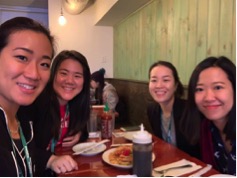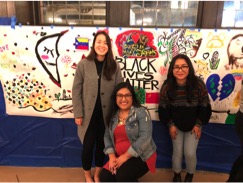Commission for Global Dimensions of Student Development
Monday, 8 July 2019 - 12:43pm
Tell us about yourself and your role within the Commission.
My name is Konoka Shiino; I will be serving as one of the Membership Coordinators of the Commission for Global Dimensions of Student Development (CGDSD). I am excited to share our efforts in bringing international perspectives with the American College Personnel Association (ACPA) members from all functional areas by providing unique and fun educational resources. As a membership coordinator, my goal is to make this Commission a home for international members living and working outside of the States as well as foreign-born ACPA members living and working in the States. To do so, I will ensure that each member takes advantage of every opportunity we provide and feel empowered to engage in this dynamic and global space. I cannot wait to get to know more people and their stories and knowledge through this community.

You have studied and lived in the US before you started your graduate program. Did it make it any easier being an international student in your grad program? Tell us what it was like to be an international student in your grad program.
Having completed high school and college in the United States, I was definitely more acquainted with the American academic system and how to navigate it using services/resources available on and off campus as opposed to new incoming international students. However, as I started my graduate program, I encountered a different set of challenges. The biggest was navigating my career prospects. When I started job searching during the last semester of graduate school I quickly learned that it was much more difficult than I could ever imagine, especially as a foreign-born professional seeking sponsorship for a work visa. There were times that I had to pass job offers because schools could not provide me with a visa sponsorship. As many foreign–born professionals can attest, this process is extremely complicated and nerve-wracking. That being said, through this experience I learned to be more proactive and emotionally resilient, which I think is the greatest gift I earned through the process. If you are currently looking for employment as a foreign-born professional or just curious to learn more about the work visa sponsorship process, I highly recommend you to take a look at a previous blog post by Gudrun Nyunt, PhD, a former chair of CGDSD (http://www.myacpa.org/entity/commission-global-dimensions-student-development/blog/supporting-your-foreign-born-colleagues). She wrote an excellent piece explaining her job-searching journey as a foreign-born student affairs professional. Also, Gudrun and I have presented at a webinar along with two other foreign-born student affairs professionals on this topic. Please look out for a webinar on “Navigating Higher Education: Experiences of Foreign-Born Professionals in the U.S.” on Monday, June 10, 2019 3-4PM (EDT). (http://www.myacpa.org/events/june-2019-webinar-navigating-higher-education-experiences-foreign-born-professionals-us)
There are so many functional areas within higher education, which one are you most interested in and why?
I am most interested in serving in the area of International Programs and Services. I am particularly passionate about study abroad and how students explore their identities by living and studying outside of their home countries. The biggest event that shaped my interest in this area of study is my experience in an American high school.
Having attended a predominantly white private catholic school, I was constantly reminded of my otherness by teachers, students, and their families. I remember desperately wanting to be accepted and to fit in, but looking “foreign,” speaking Japanese with my twin sister, and eating onigiri for lunch only perpetuated the differences between me and the local students. The only time I felt accepted by my peers was when I played basketball with American girls. I wasn't seen as different in the court – It felt good to not be perceived as the girl who needed special afterschool tutoring for English writing, a math genius, or one of the few Asians in school (besides my twin sister and I, there were four other international students from East Asian countries). During my high school days I genuinely wanted to reject my Japanese identity and assimilate to the dominant white culture. But then college came and I started to reconcile with my Japanese identity. Rather than seeing my culture as burdensome, I saw it in a new positive light. It was a rediscovery of my cultural identity as a Japanese woman studying abroad.
My community college’s commitment to nurturing students into global citizens had a lot to do with this change. I was very surprised by the campus’ Japanese esthetics, having within its grounds a beautiful Japanese garden as well as the Japanese Cultural Center modeled according to traditional Japanese architecture. The school even offered a major in Japanese language, which was shocking to me at that time coming from a predominantly white high school. This environment was therapeutic and helped me reconnect with my cultural roots and identity and also propelled me to take a leadership role with the Japanese Culture Club on campus. Sharing Japanese culture and language with both domestic and other international students was so validating to me and certainly encouraged me to learn different cultures and worldviews from mine. By studying and living abroad, I learned the reality of American society and what it is like to live in it. I am appreciative of my experience in the US because without it I wouldn’t have been able to connect with my cultural identity on a deeper level. Additionally, living in the States drove me to pursue a career helping marginalized student groups feel that they matter and that they can also thrive in higher education. Living and studying abroad really stimulated this process of self-discovery. This is the most important reason why I like to serve in the area of International Programs and Services.


